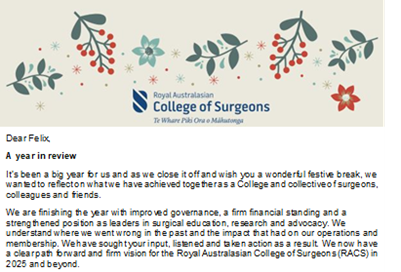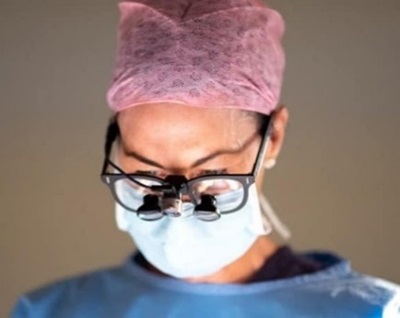2025 | Volume 26 | Issue 1

Snippets & Silhouettes
OP – LXXXXI
Author: Associate Professor Felix Behan AM
Observation and innate ability contribute to the concept of developing a successful surgical personality and time will be the final arbiter, no matter what gender, or what the outcome is.
“There is no RACS without our FRACS” quoting from the recent RACS newsletter A year in review written by RACS President Associate Professor Kerin Fielding and CEO Stephanie Clota.

RACS letter
My initial article in this submission was somewhat critical, but after receiving the newsletter, I recalled the Hemingway line about draft correspondence when he said they are usually junk.
Casual reading over the holiday season touched on topics of women's superiority on the sporting globe and how they survived on their merits. Media quoted the value of Billy Jean King’s contribution and how Stephanie (Steffi) Graff won four majors and an Olympic gold. In other words, talent was talking, not committees.
And to quote Professor Mark Ashton and his AJOPS article about surgical training, he notes current trends need constant review so improvement can be achieved.
In all training we must follow the eminence of the master surgeon on how they do it and how they solve problems—training warrants availability to be always there, even in emergency hours. In my own situation, I would attend every emergency case at the Western Hospital as a training commitment to show the Trainees tricks of the trade.

Dr Sophie Ricketts
One of my earlier Plastic Surgical Trainees, Dr Sophie Ricketts at the Western Hospital, impressed me with the way she could surgically repair wounds and on observing her refined technique she responded by saying her grandmother taught her to sew.
We know, as surgeons, good wound closure reflects the underlying surgical refinement. As the late Professor Don Marshall, renowned plastic and reconstructive surgeon and an earlier partner with Sir Benjamin Rank, said to me years ago: “If the wound looks well, it is usually pretty good underneath”. The chef always leaves their imprimatur.
Experience is the basis for one’s ongoing teaching, which must be handed on to the next generation. We have all experienced young Trainees who question some of the principles of their supervisors, regretfully. The experience of a few months does not match the experience of a few years of the consultant, and I repeat, experience is the best teacher.
Albert Einstein once said: ‘The only source of knowledge is experience’ and William Osler, Professor of Medicine at Oxford University, also said: ‘The whole art of medicine is in observation’.
I like sourcing the origins of quotes and agree with General MacArthur that rules were meant to be broken. I have applied this to some of my surgical techniques over the years, which will be the basis of my forthcoming sequel article in Surgical News and where it has led me.
And now with a modern version, a lot of alternative attitudes or practices have now crept into the social matrix. We should be cautiously courteous in any situation, maintaining harmony of the status quo, always at the personality level. So, change must occur and the latest correspondence from the College’s A year in review is the first indication of a forthcoming shift in attitude and big structures take a while to turn—look at the Titanic outcome.
Thus, in my communications regularly with a lot of the former presidents of the College, their wealth of experience becomes irreplaceable, which must not be lost.
I wrote to the president and CEO in response to their recent newsletter, congratulating them about my perception of elements of change and the courteous response was rewarding.

Cicero
And as Cicero as an orator in the Roman court observed:
“Tempora mutantur” which literally translates to: “The times change”—as relevant today as it was then—and we all know that history repeats itself.
In conclusion, a good surgeon knows how to operate, when to operate and when not to operate—an adage passed on through generations.